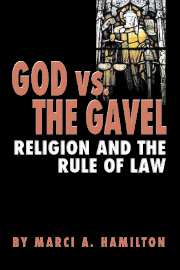Book contents
- Frontmatter
- Contents
- Acknowledgments
- Foreword, by the Hon. Edward R. Becker
- GOD VS. THE GAVEL: RELIGION AND THE RULE OF LAW
- PART ONE WHY THE LAW MUST GOVERN RELIGIOUS ENTITIES
- 1 The Problem
- 2 Children
- 3 Marriage
- 4 Religious Land Use and Residential Neighborhoods
- 5 Schools
- 6 The Prisons and the Military
- 7 Discrimination
- PART TWO THE HISTORY AND DOCTRINE BEHIND THE RULE THAT SUBJECTS RELIGIOUS ENTITIES TO DULY ENACTED LAWS
- Epilogue
- Notes
- Index
1 - The Problem
Published online by Cambridge University Press: 24 July 2009
- Frontmatter
- Contents
- Acknowledgments
- Foreword, by the Hon. Edward R. Becker
- GOD VS. THE GAVEL: RELIGION AND THE RULE OF LAW
- PART ONE WHY THE LAW MUST GOVERN RELIGIOUS ENTITIES
- 1 The Problem
- 2 Children
- 3 Marriage
- 4 Religious Land Use and Residential Neighborhoods
- 5 Schools
- 6 The Prisons and the Military
- 7 Discrimination
- PART TWO THE HISTORY AND DOCTRINE BEHIND THE RULE THAT SUBJECTS RELIGIOUS ENTITIES TO DULY ENACTED LAWS
- Epilogue
- Notes
- Index
Summary
The United States has a romantic attitude toward religious individuals and institutions, as though they are always doing what is right. As one scholar has quipped: “There is a long history in this country of religion being reduced to Sunday school morality in service of the common good.” Were religious institutions and individuals always beneficial to the public, this book would not need to be written, and they would not need to be deterred from criminal or tortious behavior. Religious liberty could be absolute. The unrealistic belief that religion is always for the good, however, is a hazardous myth. The purpose of this book is to persuade Americans to take off the rose-colored glasses and to come to terms with the necessity of making religious individuals and institutions accountable to the law so that they do not harm others.
Without a doubt many religious entities provide important benefits to society. Catholic Charities, the United Jewish Communities, and numerous other mission organizations do wonderfully good works. They feed and house the poor, counsel the addicted, minister to the downtrodden, and educate on a large scale. In 2003, religious organizations received nearly 40 percent of all charitable contributions in the United States, which translates into over $86 billion to spend on good deeds. In 2005, religious relief organizations have been indispensable in helping the millions of Indonesian tsunami victims. It is nearly impossible to imagine how the United States or the world could function without the services of these groups.
- Type
- Chapter
- Information
- God vs. the GavelReligion and the Rule of Law, pp. 3 - 11Publisher: Cambridge University PressPrint publication year: 2005
- 1
- Cited by



